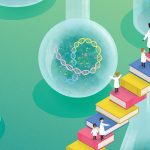Pancreatic cancers are among the most aggressive, deadly tumor types, and for years researchers have struggled to develop effective drugs against the tumors. Now, Professor Ronald Evans, first author Corina Antal, and colleagues have identified a new set of molecules that fuel the growth of tumors in pancreatic ductal adenocarcinoma (PDAC), the most common type of pancreatic cancer. The new research explains how certain gene mutations trigger out-of-control growth in pancreatic cancer by activating a “super-enhancer” that turns on other genes. They also show the effectiveness of a new drug that puts the brakes on pancreatic cancer growth by blocking the effects of that super-enhancer.
Read News ReleaseDiscoveries
All the immunity, none of the symptoms
Worldwide, more than a million deaths occur each year due to diarrheal diseases that lead to dehydration and malnutrition. Yet no vaccine exists to fight or prevent these diseases, which are caused by bacteria like certain strains of E. coli. Professor Janelle Ayres, first author Grischa Chen, and colleagues found that pairing specific diets with disease-causing bacteria can create lasting immunity against diarrheal illness in mice without the cost of developing sickness. Their discovery paves the way for the development of new vaccines that could promote immunity for those with diarrheal diseases and possibly other infections.
Read News ReleaseMapping the development of infection-fighting immune cells
Killer T cells, though a subtype themselves, can transform into even more specialized subtypes. Little was known about what influences this further differentiation until Professor Susan Kaech, Associate Professor Diana Hargreaves, co-first authors Bryan McDonald and Brent Chick, and colleagues endeavored to unravel this T cell differentiation mystery. What they discovered was that a protein complex called cBAF can open or close genetic “doors” to control T cell fate. Their findings illuminate how T cells fight and remember infections, and inspire the development of more effective vaccines and cancer therapeutics.
Read News ReleaseRevealing HIV drug-resistance mechanisms through protein structures
Associate Professor Dmitry Lyumkis and colleagues, in collaboration with the National Institutes of Health, discovered the molecular mechanisms by which human immunodeficiency virus (HIV) becomes resistant to Dolutegravir, one of the most effective, clinically used antiviral drugs for treating the infection. The new study reveals how changes to the 3D structures of integrase, an HIV protein, can lead to Dolutegravir resistance and how other compounds may be able to overcome this resistance.
Read News ReleaseWhy we lose fat and muscle during infection
Since helper T cells lead the fight against infection and can promote the activity of killer T cells, when researchers were looking to explain wasting—the loss of fat and muscle that can occur during infection—they hypothesized the two T cell types may be cooperating. Professor Janelle Ayres, first author Samuel Redford, and colleagues discovered the wasting response to infection with the bacteria T. brucei in mice occurs in two phases, each regulated by different T cell subtypes. While fat loss did not benefit the fight against infection, muscle loss did—a surprising clue that some wasting may help manage illness. The findings can inform the development of more effective therapeutics that spare people from wasting and increase our understanding of how wasting influences survival and morbidity across infections, cancers, chronic illnesses, and more.
Read News ReleaseUsing the body’s “invisible scalpel” to remove brain cancer
Professor Susan Kaech, co-first authors Dan Chen and Siva Karthik Varanasi, and colleagues found that helper T cells play a crucial role in the success of the immunotherapy treatment anti-CTLA-4 in mice with glioblastoma, the most common and deadly form of brain cancer. The immunotherapy’s success depended on helper T cells pairing up with brain-resident immune cells called microglia—demonstrating the value of the immune system’s quilted connections. The findings show the benefit of harnessing the body’s own immune cells to fight brain cancer and could lead to more effective immunotherapies for treating brain cancer in humans.
Read News ReleasePreying on hungry, anxious worms
Seeing the inside of plants in 3D
High-fat diets alter gut bacteria, boosting colorectal cancer risk in mice
The prevalence of colorectal cancer in people under the age of 50 has risen in recent decades. One suspected reason: the increasing rate of obesity and high-fat diets. Now, Professor Ronald Evans, co-first author Ting Fu, and colleagues, in collaboration with UC San Diego, discovered exactly how high-fat diets can change gut bacteria and alter digestive molecules called bile acids, predisposing mice to colorectal cancer. The findings help scientists better understand colorectal cancer and how to potentially prevent it.
Read News ReleaseFeatured Stories
 Deepshika Ramanan–From iguana poop to breastmilkRamanan, a new assistant professor and microbiologist by training, made a chance discovery about animal gut bacteria that led to her fascination with breastmilk immunity.
Deepshika Ramanan–From iguana poop to breastmilkRamanan, a new assistant professor and microbiologist by training, made a chance discovery about animal gut bacteria that led to her fascination with breastmilk immunity. New strategic plan provides roadmap for enhancing diversity, equity, inclusion, and belonging at SalkGroundbreaking scientific discoveries require talented people behind the scenes, and the more diverse those people are, the more groundbreaking their discoveries. At Salk, improving diversity, equity, and inclusion is a commitment to both scientific discovery and humanity.
New strategic plan provides roadmap for enhancing diversity, equity, inclusion, and belonging at SalkGroundbreaking scientific discoveries require talented people behind the scenes, and the more diverse those people are, the more groundbreaking their discoveries. At Salk, improving diversity, equity, and inclusion is a commitment to both scientific discovery and humanity. Trinka Adamson–Supporting Salk science through animal careAdamson, senior director of Salk’s Animal Resources Department, works to provide the highest quality veterinary medical care, husbandry, enrichment, and professional technical support to enable our scientists to conduct their animal research and make their bold discoveries.
Trinka Adamson–Supporting Salk science through animal careAdamson, senior director of Salk’s Animal Resources Department, works to provide the highest quality veterinary medical care, husbandry, enrichment, and professional technical support to enable our scientists to conduct their animal research and make their bold discoveries. Melissa Hernandez–Horses, hot sauce, and human brain researchHernandez, a postdoctoral researcher in the lab of Professor Rusty Gage, journeyed up and down the west coast and turned from scientist to hot sauce entrepreneur and back before finally settling at Salk to study neuroscience.
Melissa Hernandez–Horses, hot sauce, and human brain researchHernandez, a postdoctoral researcher in the lab of Professor Rusty Gage, journeyed up and down the west coast and turned from scientist to hot sauce entrepreneur and back before finally settling at Salk to study neuroscience. To inspire and educate: Salk’s Education Outreach is on a missionMotivated by Jonas Salk’s admonition to “be good ancestors,” Education Outreach strives to inspire the next generation of scientists. By running programs like the Mobile Science Lab or High School Science Day among others, Education Outreach encourages scientific literacy, enthusiasm in science as a career, and awareness of the value of basic research.
To inspire and educate: Salk’s Education Outreach is on a missionMotivated by Jonas Salk’s admonition to “be good ancestors,” Education Outreach strives to inspire the next generation of scientists. By running programs like the Mobile Science Lab or High School Science Day among others, Education Outreach encourages scientific literacy, enthusiasm in science as a career, and awareness of the value of basic research.
















































